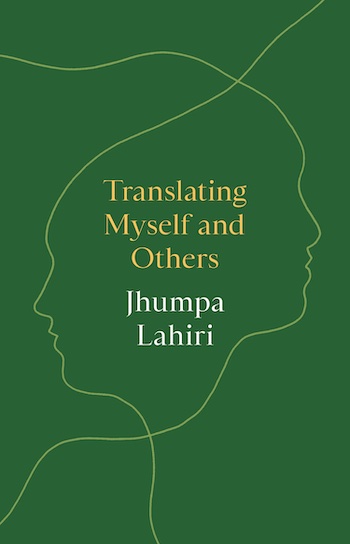Book Review: “Translating Myself and Others” — The Air We Breathe
By Tess Lewis
The cumulative effect over the course of Jhumpa Lahiri’s book sharpens our view of what the imperfect art of translation can, in fact, do.
Translating Myself and Others, by Jhumpa Lahiri. Princeton University Press, 208 pages, $21.95.
 The true center of gravity in Jhumpa Lahiri’s new collection of essays on translation and self-translation is an extended meditation on Antonio Gramsci. For this Marxist intellectual, linguist, and politician who died in 1937 at the age of forty-six after more than a decade in prison, Lahiri writes, “[t]ranslation was a reality, aspiration, discipline, anchor, and metaphor.” Translation in its many facets and applications was a foundational pillar of Gramsci’s political thought and engagement as founder of the Italian Communist party. It was also an integral part of his emotional life and most intimate communications. In her sensitive and sustained reading of his Letters from Prison and his Prison Notebooks, Lahiri teases out the direct and indirect manifestations of translation in Gramsci’s life on these levels and more: linguistic, cultural, historical, philosophical, political, and emotional. What becomes clear in her reflections on this “polyhedric” man, as well as in the nine personal essays in Translating Myself and Others, is that, in an echo of Gramsci’s experience, translation has become Lahiri’s primum mobile, the primary lens through which she views and understands the world on the page and off.
The true center of gravity in Jhumpa Lahiri’s new collection of essays on translation and self-translation is an extended meditation on Antonio Gramsci. For this Marxist intellectual, linguist, and politician who died in 1937 at the age of forty-six after more than a decade in prison, Lahiri writes, “[t]ranslation was a reality, aspiration, discipline, anchor, and metaphor.” Translation in its many facets and applications was a foundational pillar of Gramsci’s political thought and engagement as founder of the Italian Communist party. It was also an integral part of his emotional life and most intimate communications. In her sensitive and sustained reading of his Letters from Prison and his Prison Notebooks, Lahiri teases out the direct and indirect manifestations of translation in Gramsci’s life on these levels and more: linguistic, cultural, historical, philosophical, political, and emotional. What becomes clear in her reflections on this “polyhedric” man, as well as in the nine personal essays in Translating Myself and Others, is that, in an echo of Gramsci’s experience, translation has become Lahiri’s primum mobile, the primary lens through which she views and understands the world on the page and off.
Born to Indian parents in London, Lahiri moved to the United States when she was three years old. She grew up bilingual, yet her relationship to Bengali is strictly oral. She considers it her “mother tongue,” yet acknowledges that “Bengali is a language I speak and understand but do not read with sophistication or ease.” The experience of straddling two worlds and feeling at home in neither is a theme that runs throughout her stories, novels, and essays. Indeed, she has written that her 1999 Pulitzer prize-winning debut collection, The Interpreter of Maladies, was driven by “the desire to force the two worlds [she] occupied to mingle on the page as [she] was not brave enough, or mature enough, to allow in life.” Navigating those two worlds gave her a sense early on that translation was an existential mode. She opens this collection with a “translation dilemma” she faced as a five-year-old making a Mother’s Day card in kindergarten and recalls her pronouncement almost three decades later, in the wake of her stories’ unexpected success, “I translate, therefore I am.”
And yet, it was not until 2015 that Lahiri actually earned her bona fides as a literary translator by taking on the translation of Domenico Starnone’s novel Ties. In a forward to this, her first “official”, translation, she notes that writing “is a way to salvage life, to give it form and meaning. It exposes what we have hidden, unearths what we have neglected, misremembered, denied. It is a method of capturing, of pinning down, but it is also a form of truth, of liberation.” Paradoxically, the challenge of translating three of Starnone’s novels also opened her eyes to how little writing can do, to how little can be captured or pinned down in words for long, given the slippery, Protean nature of language.
It is my engagement with Starnone’s texts over the past six years that has rendered me, definitively, a translator, and this novel activity in my creative life has rendered clear the inherent instability not only of language but of life…
Lahiri suffers a more violent sense of linguistic destabilization when she finally decides, after many scruples and much hesitation, to translate Dove mi trovo, the first novel she wrote in Italian. Not only did the “brutal act of self-translation” force her “to doubt every word on the page,” it freed her, “once and for all, from the false myth of the definitive text.” Having turned Dove mi trovo into Whereabouts, it is no longer clear to her which is the original text and which the simulacrum — “the hierarchy of original and derivation” has been dissolved and two originals are created: “twins, far from identical, separately conceived by the same person, who will eventually exist side by side.”
Lahiri delves into this dissolution of hierarchy between the original and its translation in “In Praise of Echo,” an essay that originated as a lecture. She finds several keys in the myth of Echo and Narcissus to understanding translation as a process that is not merely a repetition, a derivative and restricted act of copying, but a transformation that restores meaning to the original in a new context through an application of imagination, ingenuity, and freedom. Echo and Narcissus are “two opposites and, like many opposites, two sides of the same coin.” Yet it is the nymph’s echoing of Narcissus’ words back to him that enhances his self-adoration. Those echoes, slightly altered but faithful and loving, are essential to the desire that animates the myth. In this close and scrupulous reading of Ovid’s poem, Lahiri, who has finally come to see herself as a “writer-translator,” makes a strong case for the fallacy of dismissing translations as secondary or imitative. “Translations are dispensable, but the truth is that they are also indispensable. The ongoing, updated echo of translation is critical to sustaining great works of literature, to celebrating and spreading their significance across space and time.”
It took some time for Lahiri to embrace her identity as writer-translator. She explains that she assembled this book “not only because I have become a translator in the past seven years, but to reiterate that I have always been a translator.” Still, she resisted a more formal role as translator for decades. First, she had to follow a dream she had harbored since her first trip to Italy in her twenties — becoming fluent in Italian.

Jhumpa Lahiri. Photo: Wiki
In 2014, after more than thirty years of sporadic study, Lahiri moved to Rome to pursue a quest of occupying, through Italian, a third world, which she brought to the page a year later in both Italian as In altre parole and, in Anne Goldstein’s English translation, as In Other Words. That world has been hard-won. In the essay, “Why Italian?”, an epilogue of sorts to In Other Words, she homes in on three metaphors to explain, if not justify, her decision to write in Italian. For her, writing in a new language is a door that can be a barrier or an opening; it is a partial blindness that allows her to see differently and allows her to see the blindness bred by her familiarity with English; and it is a graft that transplants and fuses onto new origins. (Oddly, given Lahiri’s attention to polysemy throughout these essays, she does not consider graft’s meaning as “obtaining profit or advantage by dishonest or shady means” in this context.) In another hierarchical reversal, Italian, though constricting in its unfamiliarity, becomes a source of freedom that she cannot find in the English she has mastered with such success. Many of her devoted English-language readers are less convinced by her Italian texts. She complains of being asked at readings when she will return to writing in English. Not any time soon it seems, for when Lahiri is away from Italy and ambient Italian, she longs for it with an almost physical ache. “The Italian language did not simply change my life; it gave me a second, an extra life.”
On the most obvious level, these essays track Jhumpa Lahiri’s deepening mastery of Italian and through it, a more profound understanding of English, the language in which she is most comfortable, if not too comfortable. Yet they also reveal a mind inclined to metaphorical thinking, endlessly circling the alchemical mystery of translation, comparing it now to this, now to that: to an echo, a metamorphosis, a doubling, a mirror in which one sees someone other than oneself, a conversation, a marriage between texts, etc. Each metaphor reflects some aspects of translation, never all. Still, the cumulative effect over the course of this book sharpens our view of what the imperfect art of translation can, in fact, do.
In his ground-breaking study, After Babel, George Steiner radically proposed that every speech act entails translation: “inside or between languages, human communication equals translation.” Humans were translating long before the destruction of the Tower of Babel. “The affair at Babel,” Steiner continued, merely “confirmed and externalized the never-ending task of the translator—it did not initiate it.” Translation is like the air we breathe: we take it for granted until we lose it. Lahiri’s essays, to extend this metaphor, are a gust of oxygen-enriched air.
Tess Lewis is a writer and translator from French and German. Her translations include works by Peter Handke, Walter Benjamin, and Philippe Jaccottet. Her awards include the 2017 PEN Translation Award for her translation of Maja Haderlap’s novel Angel of Oblivion and a Guggenheim Fellowship. She is a 2022 Berlin Prize Fellow at the American Academy in Berlin. www.tesslewis.org
